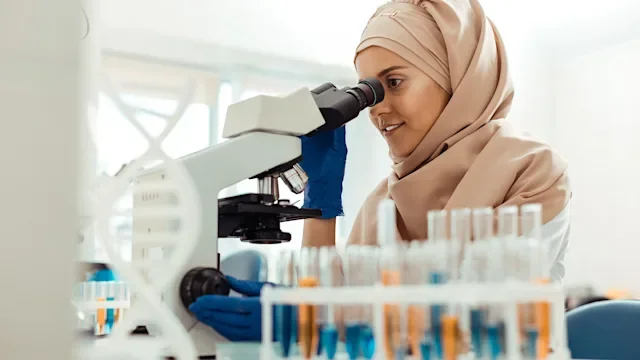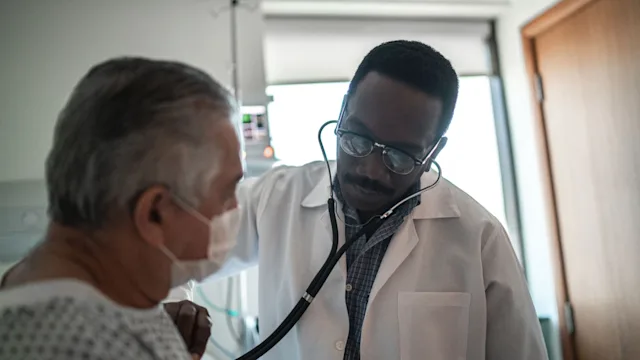Key takeaways:
COVID-19 can cause blood clots, damage to the heart muscle, and abnormal heart rhythms.
People with underlying heart conditions have worse outcomes if they get COVID-19.
Taking measures to prevent infection and improving your baseline health can help reduce the chance of developing heart problems from COVID-19.
COVID-19 was originally described as a respiratory illness (one that affects the lungs). Studies now show that COVID-19 can affect several important organs besides the lungs, including the heart and blood vessels. Heart damage caused by COVID-19 is such an important issue that the American Heart Association has pledged $2.5 million for research in this area.
How does COVID-19 affect the heart and blood vessels?
Data is still being collected on this topic, but this is what we know so far: COVID-19 is caused by the SARS-CoV-2 virus. The virus infects the cells of the body by attaching to a specific receptor, called ACE2, which is located on the cells of the heart, blood vessels, and lungs. When SARS-CoV-2 attaches to ACE2 and enters these cells, the virus can cause significant damage, and can even cause cells to die. In addition, the body launches a strong immune response — and in some cases, an autoimmune response — to the virus, which can also lead to organ damage. When blood vessels are damaged, abnormal blood clots can form in the arteries and veins, which can lead to more problems with your organs, including the heart, lungs, and brain.
What types of heart disease can COVID-19 cause?
COVID-19 affects people very differently. Some people have no symptoms, or very mild symptoms, and have no significant damage to their heart or blood vessels. Others become very ill, require treatment in the hospital, and can have extensive heart and blood-vessel damage. It is still unclear why some people get sicker than others do, but this is a subject of ongoing research.
Search and compare options
Can COVID-19 cause a heart attack?
Yes, people who are sick with COVID-19 can have heart attacks. It is not always clear whether heart attacks in these people are caused by the virus, or whether they already had blockages in their heart arteries before they became ill. When a person with problems in their arteries gets an infection, their heart and blood vessels are placed under a lot of stress. The heart needs to work harder than it does in normal circumstances, and this extra demand can trigger a heart attack. To make matters worse, people with COVID-19 can have lower oxygen levels, and are at a higher risk of blood clots — both of which can also contribute to a heart attack.
What other heart problems can COVID-19 cause?
In addition to increasing the risk of heart attacks, COVID-19 can affect the heart in other ways. The virus can directly infect the heart and blood vessels. It can also cause high levels of inflammation all over the body as the immune system tries to fight off the virus. These factors, in combination with decreased oxygen levels, can create a “perfect storm” for heart problems, including:
Abnormal heart rhythms, also called arrhythmias: Affect the efficiency of the heart to pump blood to the body
Heart muscle inflammation, also called myocarditis: Causes chest pain, shortness of breath, and heart muscle weakness in severe cases
Stress cardiomyopathy: Heart muscle weakness that is usually temporary, caused by extreme stress on the body, such as an infection
Heart failure: A condition in which the heart has a reduced ability to pump blood to the body and lungs
Cardiac arrest: When the heart goes into a dangerous heart rhythm, which can cause the heart to stop, leading to death
Can COVID-19 cause blood clots?
Yes. As we’ve mentioned already, COVID-19 can lead to abnormal blood clots in blood vessels. One of the most serious types of blood clot caused by COVID-19 is a pulmonary embolism, or PE. This dangerous blood clot forms in the blood vessels of the lung, preventing oxygen in the lungs from getting into the blood. A PE can also put the right-sided chamber of the heart (the right ventricle) under a lot of stress. Weakness and enlargement of the right ventricle are the most common abnormalities seen on heart scans of people hospitalized with COVID-19.
What if I already have heart issues and get COVID-19?
People who already have certain risk factors and heart conditions have a higher chance of becoming severely ill from COVID-19.
These conditions include:
If you have heart problems, and are diagnosed with — or suspect you could have — COVID-19, you’ll want to be extra cautious.
If you think you have COVID-19, call your healthcare providers immediately so they can assist you with what to do next. Do not stop or start any medications or supplements until talking to your provider. And you should immediately call 911 or go to the emergency room if you develop any concerning symptoms, including shortness of breath, chest pain, or dizziness.
Do the COVID-19 vaccines cause heart damage?
Recently, there have been some rare reports of young adults and teens getting a heart condition called myocarditis (heart inflammation) after receiving the COVID-19 vaccine. The American Heart Association released a statement confirming that myocarditis is a very unusual complication, that the risks of the vaccine are much less dangerous than the risks of COVID-19 infection, and that the vaccine is still recommended for people older than 12. If you have any additional concerns about this issue, please talk to your, or your child’s, healthcare provider.
Does “long haul” COVID cause heart problems?
At least 10% of people who get COVID can have symptoms for more than 4 weeks. This condition is called long COVID or long-haul COVID. Many people with long COVID report lingering cardiac symptoms, such as:
Chest pain
Shortness of breath
Palpitations
POTS is an abnormal increase in heart rate when a person stands up from a lying position, which can lead to:
Dizziness
Weakness
Exercise intolerance
Fatigue
Because long COVID is so new, data is still being collected on people dealing with this condition.
What can I do to protect myself from heart complications of COVID-19?
There are many simple steps you can take to reduce your risk of having heart complications after COVID-19:
First and foremost, reduce your chances of becoming ill with COVID-19: This can be done by getting vaccinated and practicing social-distancing measures, like wearing a mask, washing your hands, keeping distance between yourself and others (especially indoors), and limiting travel.
If you already have heart disease, check in regularly with your healthcare provider: Because of the pandemic, many people with heart disease have missed out on routine health visits. If you are not comfortable going to the office and you are due for a check-up, ask your provider whether they offer telemedicine visits.
Work with your physician to check for and treat any heart risk factors, such as diabetes, high cholesterol, and high blood pressure.
Start or keep up with healthy lifestyle changes: Several lifestyle changes can help your heart stay healthy. These include eating a balanced diet, making exercise a part of your daily life, losing weight or maintaining a healthy weight, and cutting out smoking.
The bottom line
The virus that causes COVID-19 can damage the cells of the heart and blood vessels, and it can make some people very ill. The risk of severe illness from COVID-19 is especially high in people with underlying heart disease. The best way to prevent heart disease caused by COVID-19 is to take precautions to prevent COVID-19 infection in the first place, such as getting vaccinated and wearing a mask. If you have heart disease, and have questions or concerns about COVID-19, touch base with your healthcare providers to discuss the next steps in your care.

Why trust our experts?


References
American Heart Association. (2021). COVID-19 vaccine benefits still outweigh risks, despite possible rare heart complications.
American Heart Association. (2021). Our response to COVID-19.
American Heart Association. (2021). What is cardiac arrest?
American Heart Association. (2022). What is a heart attack?
Bhatt, A. S., et al. (2021). Clinical outcomes in patients with heart failure hospitalized with COVID-19. JACC: Heart Failure.
Centers for Disease Control and Prevention. (2022). Long COVID or post-COVID conditions.
Centers for Disease Control and Prevention. (2023). People with certain medical conditions.
Chang, W., et al. (2021). Cardiac involvement of COVID-19: A comprehensive review. The American Journal of the Medical Sciences.
Cleveland Clinic. (2020). How coronavirus is causing a wave of ‘broken heart syndrome’.
Dherange, P., et al. (2020). Arrhythmias and COVID-19: A review. JACC: Clinical Electrophysiology.
Geddes, L. (2021). Why do some people with COVID-19 get sicker than others? VaccinesWork.
GlobalData Healthcare. (2021). Myocarditis: A potentially dangerous aftereffect from Covid-19. ClinicalTrials Arena.
Harvervall, S., et al. (2021). Symptoms and functional impairment assessed 8 months after mild COVID 19 among health care workers. Journal of the American Medical Association.
John Hopkins Medicine. (n.d.). Postural orthostatic tachycardia syndrome (POTS).
Kite, T. A., et al. (2021). International prospective registry of acute coronary syndromes in patients with COVID-19. Journal of the American College of Cardiology.
Mayo Clinic. (2022). Pulmonary embolism.
Patient-Led Research Collaborative. (n.d.). About the patient-led research collaborative.
Sriram, K., et al. (2020). What is the ACE2 receptor, how is it connected to coronavirus and why might it be key to treating COVID-19? The experts explain. The Conversation.
Szabo, L. (2021). Coronavirus deranges the immune system in complex and deadly ways. Kaiser Health News.
Szekely, Y., et al. (2020). Spectrum of cardiac manifestations in COVID-19: A systematic echocardiographic study. Circulation.
Washington University School of Medicine. (2021). COVID-19 can kill heart muscle cells, interfere with contraction. EurekAlert!
Washington University School of Medicine. (2021). COVID-19 disrupts heart muscle contraction, may lead to heart failure. News-Medical.













